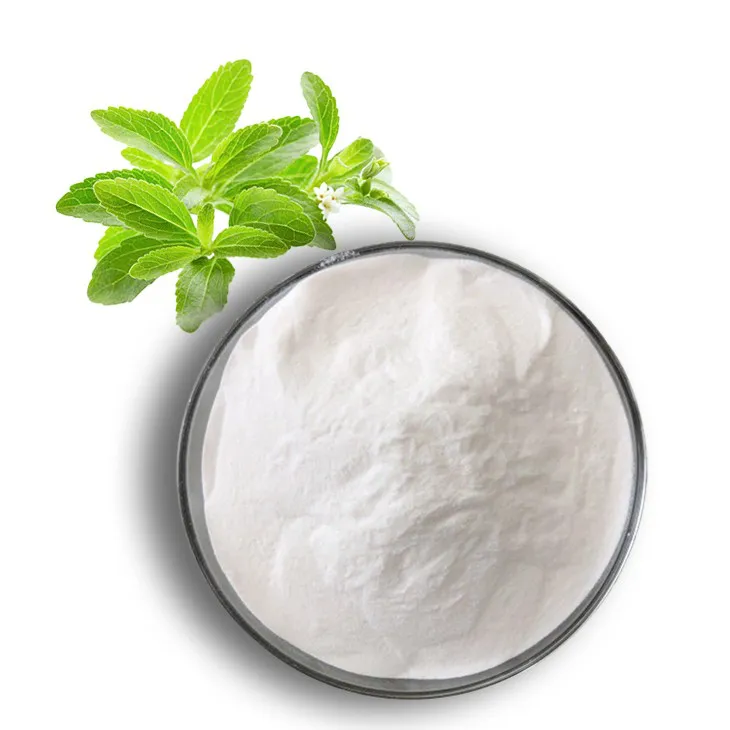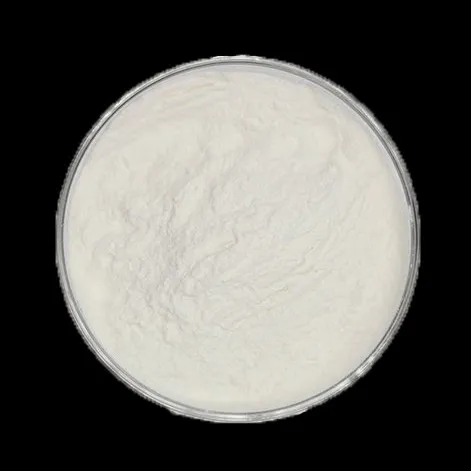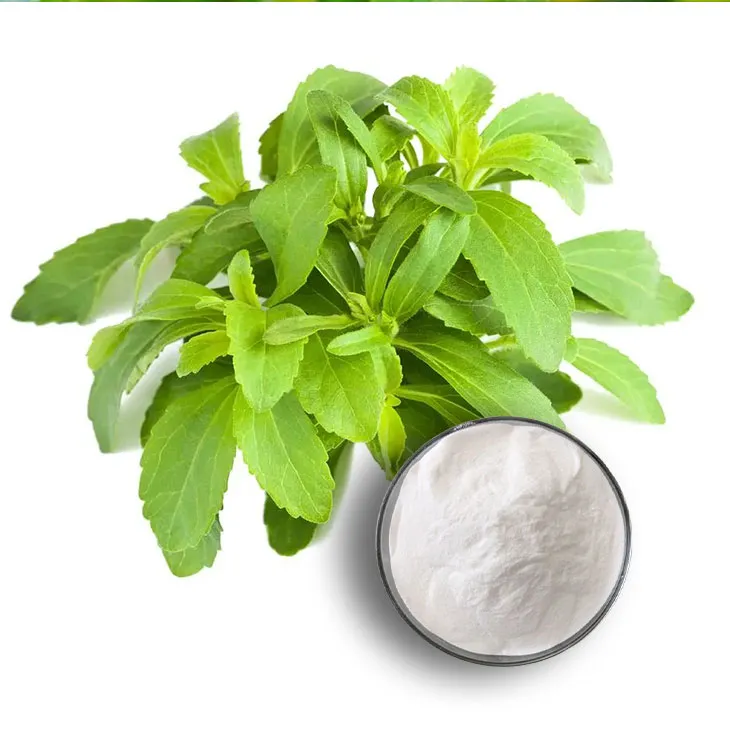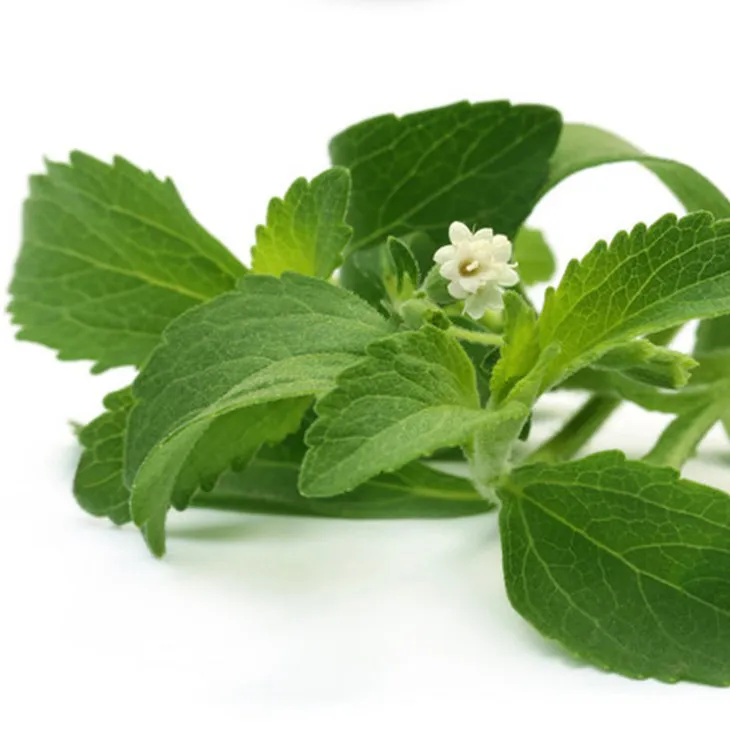- 0086-571-85302990
- sales@greenskybio.com
What is stevia extract? Definition, types, history and nutritional value.
2024-12-19

1. Definition of Stevia Extract
Stevia Extract is a natural sweetener that is obtained from the leaves of the Stevia rebaudiana plant. It has emerged as a popular alternative to traditional sugar and artificial sweeteners in recent years. The extraction process involves isolating the sweet compounds present in the stevia leaves. These compounds are responsible for the intense sweetness of the extract, which can be many times sweeter than sugar. This makes it possible to use very small amounts of Stevia Extract to achieve the same level of sweetness as a much larger quantity of sugar.

2. Types of Stevia Extract
2.1 Stevioside
Stevioside was the first stevia compound to be discovered. It is one of the main sweet components in stevia extract. Stevioside is highly sweet, but it may have a slightly bitter aftertaste compared to other types of stevia extracts. However, it is still widely used in various products due to its significant sweetening power. In fact, it is often used in combination with other sweeteners or flavorings to mask its aftertaste and optimize the overall taste of the product.
2.2 Rebaudioside A
Rebaudioside A is another important type of stevia extract. It has a better taste profile compared to stvioside. Rebaudioside A has less of an aftertaste, which makes it more appealing for use in a wide range of food and beverage products. It is also considered to be of higher quality in terms of taste and is often preferred in applications where a more pure and pleasant sweet taste is desired. Many manufacturers are increasingly focusing on using rebaudioside A - rich stevia extracts in their products to meet consumer demands for a natural, low - calorie sweetener with a good taste.

3. History of Stevia Use
The use of stevia has a long and interesting history. It dates back to ancient times in South America, where the native people were the first to discover the sweetening properties of the Stevia rebaudiana plant. For centuries, they used the stevia plant in its natural form to sweeten various beverages and foods. This traditional use was passed down through generations in the local communities.
In modern times, the exploration and development of stevia as a commercial sweetener began to gain momentum. Initially, stevia was not well - known outside of South America. However, as the demand for natural and low - calorie sweeteners grew, stevia started to attract more attention. Scientists began to study the plant in more detail, leading to the discovery of the different sweet compounds present in stevia, such as stevioside and rebaudioside A. As a result, stevia extract gradually entered the global market and became a significant alternative to artificial sweeteners.

4. Nutritional Value of Stevia Extract
4.1 Low - Calorie or Calorie - Free
One of the most important nutritional aspects of stevia extract is its extremely low - calorie or even calorie - free nature. This makes it an excellent choice for people who are trying to reduce their calorie intake, whether for weight management or other health reasons. Unlike sugar, which is high in calories and can contribute to weight gain if consumed in excess, stevia extract can provide sweetness without adding significant calories to the diet. For example, a teaspoon of sugar contains about 16 calories, while an equivalent amount of stevia extract contains negligible or no calories at all.
4.2 Blood Sugar - Friendly
Stevia extract does not raise blood sugar levels, which is a major advantage for diabetics and people with insulin resistance. When we consume sugar, our blood sugar levels spike, which requires the pancreas to secrete insulin to regulate the blood sugar. However, stevia extract does not trigger this response in the body. This means that diabetics can use stevia extract as a sweetener without worrying about adverse effects on their blood sugar control. In addition, it may also be beneficial for those at risk of developing diabetes, as it can help them avoid the blood sugar spikes associated with regular sugar consumption.
4.3 Antioxidant Properties
Stevia extract contains antioxidant properties, which may have potential health benefits. Antioxidants are substances that can protect the body against damage from free radicals. Free radicals are unstable molecules that can cause oxidative stress in the body, which is associated with various health problems such as aging, heart disease, and cancer. By containing antioxidants, stevia extract may help to neutralize free radicals and reduce the risk of these diseases. Although more research is needed to fully understand the extent of these antioxidant benefits, the presence of antioxidants in stevia extract is an exciting area of study.

5. Stevia Extract in the Food and Beverage Industry
Stevia extract has found wide applications in the food and beverage industry. In the beverage sector, it is used in soft drinks, teas, and energy drinks. For example, many diet soft drinks now use stevia extract as a replacement for artificial sweeteners or a partial substitute for sugar. In the food industry, it is used in a variety of products such as baked goods, candies, and dairy products. However, the use of stevia extract in food and beverage products also presents some challenges. For instance, its taste and stability need to be carefully managed to ensure that the final product has an acceptable taste and a long shelf - life.
6. Stevia Extract in the Pharmaceutical Industry
The pharmaceutical industry has also shown an interest in stevia extract. Its non - caloric and blood - sugar - friendly properties make it a potential ingredient in medications for diabetic patients. For example, it could be used in oral medications or liquid formulations where a sweetener is required but without the negative impact on blood sugar levels. Additionally, the antioxidant properties of stevia extract may also be explored for potential use in drugs aimed at preventing or treating diseases related to oxidative stress.
7. Regulatory Status of Stevia Extract
The regulatory status of stevia extract varies from country to country. In some countries, it has been approved for use as a food additive without any restrictions. For example, in Japan, stevia has been used for decades and is widely accepted as a natural sweetener. In the United States, the Food and Drug Administration (FDA) has also approved certain forms of stevia extract for use in food and beverages. However, in other countries, there may still be some regulatory hurdles or limitations on its use. These differences in regulatory status can affect the availability and use of stevia extract in different parts of the world.
8. Future Prospects of Stevia Extract
The future looks promising for stevia extract. As consumers become more health - conscious and demand for natural, low - calorie sweeteners continues to rise, stevia extract is likely to gain even more popularity. Manufacturers are expected to invest more in research and development to improve the taste and quality of stevia - based products. There is also potential for the discovery of new applications of stevia extract in areas such as cosmetics and nutraceuticals. However, challenges such as cost - effectiveness and consumer acceptance of its taste still need to be addressed to fully realize the potential of stevia extract in the future.
FAQ:
What is stevia extract?
Stevia extract is a natural sweetener that is obtained from the leaves of the Stevia rebaudiana plant.
What are the main types of stevia extract?
The main types of stevia extract are stevioside and rebaudioside A. Stevioside was the first to be discovered and is one of the main sweet components, while rebaudioside A has a better taste profile with less aftertaste.
What is the history of stevia extract?
The use of stevia dates back to ancient times in South America, where the native people used the stevia plant for sweetening. In modern times, it has become a significant alternative to artificial sweeteners because it is natural.
Does stevia extract have any nutritional value?
Yes, stevia extract is very low - calorie or even calorie - free. It does not raise blood sugar levels, so it is suitable for diabetics. It also has antioxidant properties which may have potential health benefits.
Why is stevia extract becoming more popular?
Stevia extract is becoming more popular because it is a natural sweetener, has low or no calories, does not raise blood sugar levels, and has potential health benefits.
Related literature
- The Nutritional and Health Benefits of Stevia Extract"
- "Stevia Extract: A Comprehensive Review of Its Types and Applications"
- "The History and Future of Stevia as a Sweetener"
- ▶ Hesperidin
- ▶ citrus bioflavonoids
- ▶ plant extract
- ▶ lycopene
- ▶ Diosmin
- ▶ Grape seed extract
- ▶ Sea buckthorn Juice Powder
- ▶ Beetroot powder
- ▶ Hops Extract
- ▶ Artichoke Extract
- ▶ Reishi mushroom extract
- ▶ Astaxanthin
- ▶ Green Tea Extract
- ▶ Curcumin Extract
- ▶ Horse Chestnut Extract
- ▶ Other Problems
- ▶ Boswellia Serrata Extract
- ▶ Resveratrol Extract
- ▶ Marigold Extract
- ▶ Grape Leaf Extract
- ▶ blog3
- ▶ blog4
- ▶ blog5
-
Pure 85% Tomentil Extract.
2024-12-19
-
Senna Leaf Extract
2024-12-19
-
Bayberry Extract
2024-12-19
-
Lily extract
2024-12-19
-
Hops Extract
2024-12-19
-
Quercetin
2024-12-19
-
Eyebright Extract
2024-12-19
-
Andrographis Paniculata Extract Powder
2024-12-19
-
Europen Bilberry Extract
2024-12-19
-
Peppermint Extract Powder
2024-12-19
-
Tongkat Ali Extract Powder
2024-12-19





















